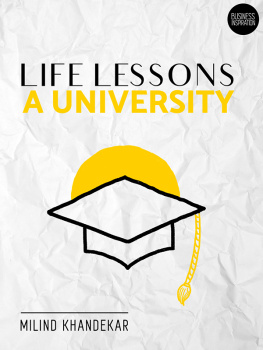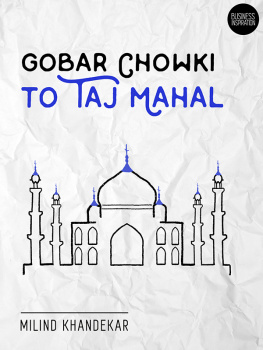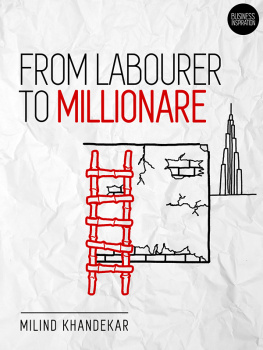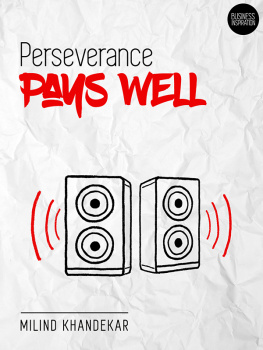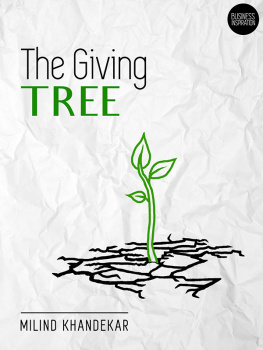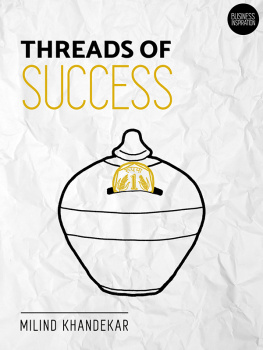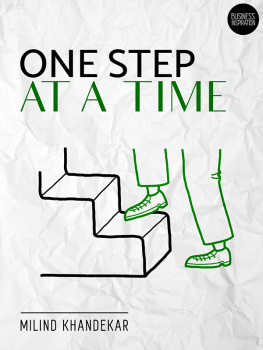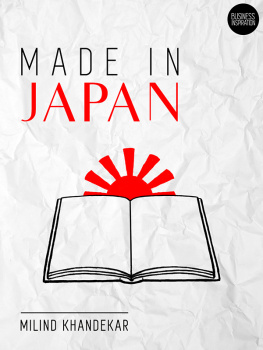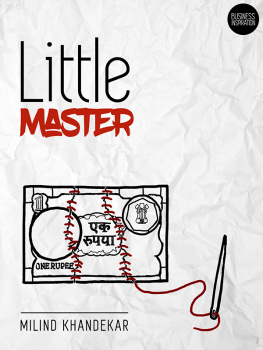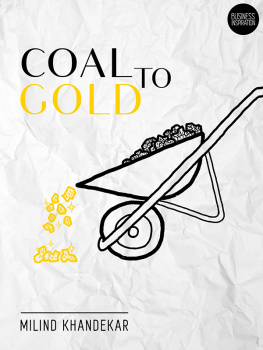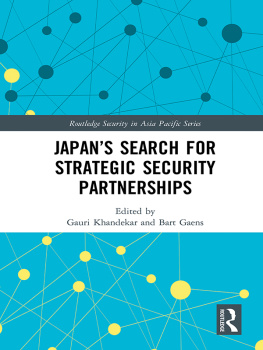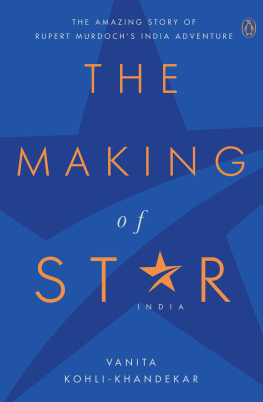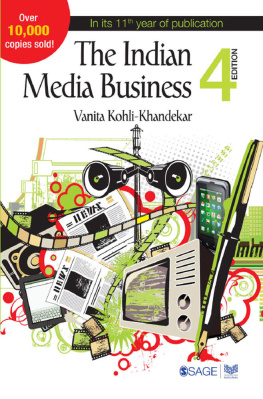Khandekar - Life Lessons A University
Here you can read online Khandekar - Life Lessons A University full text of the book (entire story) in english for free. Download pdf and epub, get meaning, cover and reviews about this ebook. year: 2017, publisher: Penguin Books Ltd, genre: Romance novel. Description of the work, (preface) as well as reviews are available. Best literature library LitArk.com created for fans of good reading and offers a wide selection of genres:
Romance novel
Science fiction
Adventure
Detective
Science
History
Home and family
Prose
Art
Politics
Computer
Non-fiction
Religion
Business
Children
Humor
Choose a favorite category and find really read worthwhile books. Enjoy immersion in the world of imagination, feel the emotions of the characters or learn something new for yourself, make an fascinating discovery.
- Book:Life Lessons A University
- Author:
- Publisher:Penguin Books Ltd
- Genre:
- Year:2017
- Rating:4 / 5
- Favourites:Add to favourites
- Your mark:
- 80
- 1
- 2
- 3
- 4
- 5
Life Lessons A University: summary, description and annotation
We offer to read an annotation, description, summary or preface (depends on what the author of the book "Life Lessons A University" wrote himself). If you haven't found the necessary information about the book — write in the comments, we will try to find it.
Life Lessons A University — read online for free the complete book (whole text) full work
Below is the text of the book, divided by pages. System saving the place of the last page read, allows you to conveniently read the book "Life Lessons A University" online for free, without having to search again every time where you left off. Put a bookmark, and you can go to the page where you finished reading at any time.
Font size:
Interval:
Bookmark:





UK | Canada | Ireland | Australia
New Zealand | India | South Africa
Penguin Books is part of the Penguin Random House group of companies whose addresses can be found at global.penguinrandomhouse.com.

Copyright Milind Khandekar 2013
The moral right of the author has been asserted
This digital edition published in 2016.
e-ISBN: 978-9-386-65177-8
This book is sold subject to the condition that it shall not, by way of trade or otherwise, be lent, resold, hired out, or otherwise circulated without the publishers prior consent in any form of binding or cover other than that in which it is published and without a similar condition including this condition being imposed on the subsequent purchaser.


Let the conversation begin...
Follow the Penguin Twitter.com@PenguinIndia
Keep up-to-date with all our stories YouTube.com/PenguinIndia
Like Penguin Books on Facebook.com/PenguinIndia
Find out more about the author and
discover more stories like this at penguinbooksindia.com
PENGUIN
Milind Khandekar has over twenty-two years of experience in the field of journalism. He is currently managing editor at Media Content and Communications Services (I) Pvt. Ltd (MCCS), and looks after the editorial content of ABP News, ABP Ananda and ABP Majha. He has previously worked with the Navbharat Times and Aaj Tak. He is a product of the Times Centre for Media Studies, and received the Rajendra Mathur Award for best trainee (Hindi) in 1991.

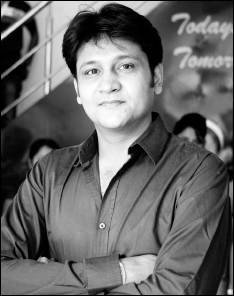
PROJECTILE MOTION IS AN intimidating term. In order to comprehend it in terms of physics, one would have to resort to using technical words like velocity, gravity, angle, etc., and perhaps also chalk out theorems and equations on a blackboard to determine the route of an object thrown up in the air. Would an object thrown up at 45 degrees land further than one thrown up at 90 degrees?
Harsh Bhaskar of Agra teaches physics differently. He writes nothing on the blackboard. He explains the concept by actually throwing a pebble in the classroom. When he throws it straight up, it comes down and falls right in front of him; but when he throws it up at an angle, it falls away from him. Children find it easy to understand the difference between 45 and 90 degrees when it is demonstrated like this. While teaching chemistry, he tells the children to imagine that there is a chemical factory in their house. He asks questions relating to what they know. Why does salt become soggy in the monsoons? Why does the sulphuric acid kept in the toilet let off smoke the minute it touches the floor?
Harsh doesnt believe in teaching verbatim from textbooks, but believes in connecting science subjects to real life. He believes teachers who do not do so hinder childrens learning and leave important concepts like projectile motion hazy in the minds of the learners.
Harsh is known to be a teacher par excellencehe insists he is a much better businessman. An alumnus of the Indian Institute of Technology (IIT), Roorkee, Harsh Bhaskar is the chairman of Kota Tutorials, and has been coaching students since 2002. Kota Tutorials was first set up in Agra and now has franchises in twelve Indian cities. Approximately 8000 students use Kota Tutorials to prepare for the entrance tests of various engineering and medical colleges spread across the country. Harsh says that, by now, about 30,000 students have been taught by him. Of these, close to 100 have joined the elite IITs, and most others have found their way into other prestigious colleges.
Over the past two years, Harsh has greatly expanded his business. He has established the Nirmala Group of Institutes in Farah, in the district of Mathura, on a 25-acre campus that houses seven engineering and management colleges along with a polytechnic and training college for teachersequalling about 1800 students on campus. Harshs dream is to see this campus become a full-fledged private university. He believes that this can happen soonhe only needs four more faculty members to add to his existing seven. When established, the university will be the first to be owned and run by a Dalita milestone in the fast-changing social scenario of modern-day India. It is astounding to think that in the days of yore it was almost impossible for Dalits to have access to education.
There was no tradition of formal education in Harshs family in Agra. His father ran a small shoe factory. Harsh was the youngest of six siblings: two brothers and six sisters. Harshs eldest brother completed his education in science, acquiring an MSc degree, and helped Harsh study by sending him to St Conrad Convent School. Harsh believes his joining the Radha Swami Educational Institute proved to be a game changer.
After finishing class twelve, in keeping with the existing trend of career choices, he wrote the entrance test for engineering and was admitted into the Roorkee Engineering College. Even though his father did not have a very clear idea about the institution, he knew his son was going to study in one of the oldest and most prestigious colleges in Asia. It was established in 1847 by Lieutenant Governor James Thomson of the erstwhile North-Western Province. There was a specific reason for choosing Roorkee as the location for this educational institution. The British wanted to build a canal for diverting the waters of the Ganga for agricultural purposes, and for this they required civil engineers, both for construction and, later, for the maintenance of the proposed canal. Close to Haridwar, where the Ganga flows, Roorkee presented itself as the ideal site for setting up an engineering college. After about a hundred years, soon after India gained Independence, the college became the University of Roorkee, and in 2001, the Parliament granted it the status of an IIT.
Harsh studied mechanical engineering at Roorkee and earned a BTech degree. The common assumption that one becomes a doctor or engineer entirely on the basis of reservation irritates Harsh, and he clarifies that reservation is applicable only at the stage of admission and not for the examinations you take once you have been admittedclearing an entrance test in no way means that an entrant has successfully received a degree. Additionally, Harsh says that Dalit students usually have to face discrimination in an IIT as their classes are held separately, their answer sheets are more rigorously marked, etc. Luckily, however, he did not have to face any of these challenges. Roorkee made him a good engineer, shaped him into a better person and enhanced his self-confidence. He was not only able to prove himself academically, he also helped teachers in completing team projects, organized festivals and even ran a trekking club.
Font size:
Interval:
Bookmark:
Similar books «Life Lessons A University»
Look at similar books to Life Lessons A University. We have selected literature similar in name and meaning in the hope of providing readers with more options to find new, interesting, not yet read works.
Discussion, reviews of the book Life Lessons A University and just readers' own opinions. Leave your comments, write what you think about the work, its meaning or the main characters. Specify what exactly you liked and what you didn't like, and why you think so.

